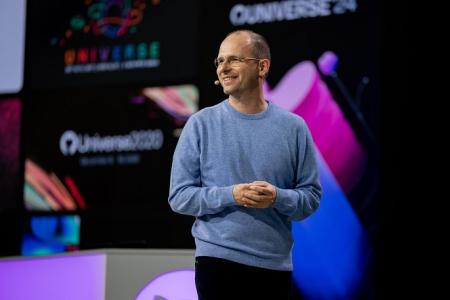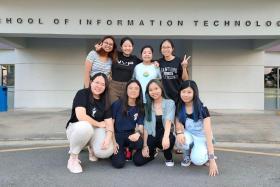S’pore has 1.3m coders, ranks 9th globally for helping AI projects
SAN FRANCISO – Out of a population of six million in Singapore, more than 1.3 million are coding to solve tech issues.
And that number is growing among the fastest worldwide, at a rate of 28 per cent in the 12 months to September 2024, according to developer platform GitHub.
Boosted by the government’s efforts to get local workers and students trained in artificial intelligence (AI), Singapore’s coding community also punched above its weight, ranking 9th globally for contributors making software on AI cases in the same period.
Over 9,700 coders here contributed to AI projects on the open-source platform, where code is available for users to view, modify, and distribute.
GitHub, in its annual Octoverse report, said: “In 2024, there was a 59 per cent surge in the number of contributions to generative AI projects on GitHub and a 98 per cent increase in the number of projects overall – and many of those contributions came from places like India, Germany, Japan, and Singapore.”
The findings, based on unique GitHub users logging in from Singapore, were released at the GitHub Universe conference in San Francisco, which drew 3,000 participants on Oct 29 and 30.
At the conference, GitHub chief executive Thomas Dohmke and other presenters introduced new AI tools and features, including a headliner which lets developers choose which large language models from Anthropic, Google, and OpenAI they want to power their GitHub Copilot, the platform’s AI coding assistant.
“There is no one model to rule every scenario, and developers expect the agency to build with the models that work best for them,” Mr Dohmke said.
Mr Dohmke, a developer himself, also launched the pilot for GitHub Spark, an AI tool that makes web apps with natural language prompts.
He demonstrated the new tool by building a Tic-Tac-Toe game within minutes.
“For far too long, there has been a high, solid, concrete barrier that separated the vast majority of the world’s citizens from creating software,” he said, explaining the appeal of Spark.
With natural language coding, the tech economy will now have fewer limits on opportunities, he added.
GitHub, which has over 100 million users, will also inch closer to its vision of having one billion users by as early as 2030 with Spark, which comes as more non-English speakers utilise multilingual generative AI tools for coding.
Ms Sharryn Napier, GitHub’s vice-president for Asia-Pacific, said even in Singapore, where roughly one in four is a GitHub user, growth continues as more non-tech individuals start coding.
Companies are increasingly seeking AI skills in software developer hires, she added.
Asked if it could lead to firms hiring more Singaporeans as developers, she said: “That’s one of the things that we see as a big change, the way that the resources are sourced and the way people farm out the projects.”
There are no plans to raise charges for the added tools, said Mr Dohmke.
Individuals pay US$10 ($13) a month or $100 annually, while businesses pay US$19 or US$39 for added features or customisation. GitHub is free for students, teachers, and maintainers of popular open-source projects.
Analyst and founder of Creative Intellect Consulting Bola Rotibi said GitHub is encouraging developers, who have many choices, to sample it.
“They’re making it easier for people, developers, to access the models, to really kind of play around with them,” she said. “If it’s actually starting to answer questions and help them to deliver quality code, in a reasonable timeframe, I think they (users) will pay for it.”
GitHub, which is owned by Microsoft, has 1.8 million paying users.
While it is not yet a revenue line, it has nevertheless been singled out by Microsoft CEO Satya Nadella as a promising earner for its Copilot tool, which customers like ANZ Bank said have improved their coders’ productivity by as much as 42 per cent.
In its last earnings call on July 30, Mr Nadella said more than 27,000 companies had used its AI GitHub Copilot to generate code since its launch in 2022.
Mr Nadella, whose remit spans Azure, Windows, Xbox and LinkedIn among others, projects GitHub’s annual revenue at US$2 billion.
It is a drop in the tech giant’s US$212 billion revenues in 2023, but Mr Nadella added that GitHub Copilot accounted for over 40 per cent of GitHub’s revenue growth in 2023. That exceeded GitHub’s total revenue when it was acquired in 2018 for US$7.5 billion.
GitHub reportedly made about US$300 million in revenues in 2018.
GitHub added that in 2024, Python surpassed JavaScript as the most popular language on GitHub, while Jupyter Notebooks usage surged by 92 per cent, reflecting a growing interest in data science, AI, and machine learning.
Jupyter Notebooks is an open-source web application for creating documents with live code, equations, visualisations, and text.
Mr Dohmke, addressing a hall of delegates, said that the second phase of AI code generation is here.
It is centred on autonomous AI assistants that can understand context, accomplish tasks without constant human prompting, and learn from its own doings.
Forrester’s senior analyst Andrew Cornwell said: “No one knows for sure how AI agents will be valuable in the long haul, but it certainly looks like they have value. I think GitHub sees that as well,” he said.
In Mr Dohmke’s new coding world, instead of just talking to AI to write code, developers will tell AI assistants what they want done in plain language. Every developer will have a team of these AI helpers to create new systems, and developers would choose entire AI models that best fit their needs.
GitHub has made a start, he said. “We deliver it right here, right now.”
Get The New Paper on your phone with the free TNP app. Download from the Apple App Store or Google Play Store now


